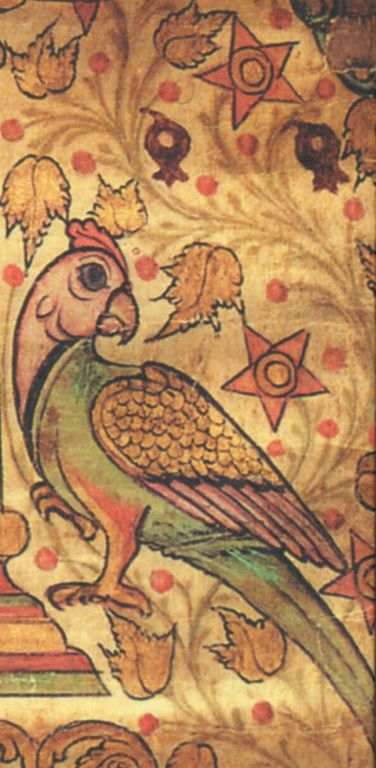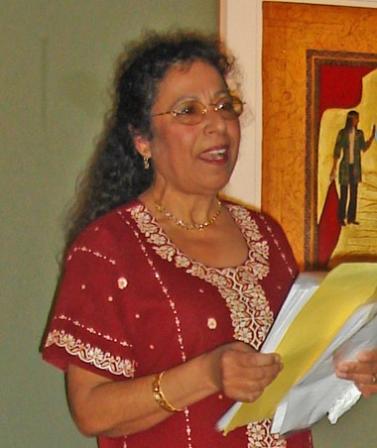2006
5. Mala Synagogue Song
Yocheved Ben Eliyahu. Recorded by Barbara Johnson, Yesod HaMaalah, May 2006; I-22.
Pĕriyavanḍĕ tuṇa veṇametu nerattuṃ
Pĕśakillātĕ peḻa poṟuṃ taṃburānĕ
1. May Almighty God be the source of my help
To do this without any error, O Lord.2. After Palur’s[1] destruction, ’twas then that they came
To Kodungallur, where the ruler proclaimed:3. “All kinds of Peoples[2] are found in my land,
But only the Jews are not here in my land.4. So ten of you should stay in this place.”
“For ten of us to remain in this place,5. We first need your help, a paḷḷi to build.”
“Then go out and choose the place that you like.”6. And so he went forth—out went Yoseph Rabban,
And all his attendants accompanied him.7. To the west of the street, in a wide-open place,
The site of the paḷḷi was marked out with stakes.8. By the ruler’s order, the stonework began.
River-bed sand, lime, and stones were brought in.9. When the stonework was done, woodwork must begin,
And so he went forth—out went Yoseph Rabban,10. And all his attendants accompanied him.
They went to the ruler. Before him they stood.11. “What’s happening, Yoseph, why have you come?”
“The stonework is finished. It’s time for the wood.”12. “Then go to the mountains and cut down the trees.”
Again he went forth—out went Yoseph Rabban,13. And all his attendants accompanied him.
They went to the mountains and cut down the trees.14. But as they returned, bringing the wood,
The ruler of Attangad seized it from them.15. A temple was built with the wood that he seized,
And the temple caught fire. It caught fire and burned.16. Again he went forth—out went Yoseph Rabban,
And all his attendants accompanied him.17. They went to the ruler. Before him they stood.
“What’s happening, Yoseph, why have you come?”18. “While we were coming back here with the wood,
The ruler of Attangad seized it from us,19. A temple was built with the wood that he seized,
And that temple caught fire. It caught fire and burned!”20. Then said the ruler of Kodungallur:
“Go to the mountains and cut down the trees.”21. “Go cut the wood that appeals to your eye.”
And so he went forth—out went Yoseph Rabban,22. And all his attendants accompanied him.
They went to the mountains and cut down the trees.23. They cut down the wood that appealed to the eye.
And then he declared, then said Yoseph Rabban:24. “If you want to give us the help that we need,
Without halt for a guard, without paying a toll,25. A boat must be brought, without any leak.”
Without halt for a guard, without paying a toll,26. A boat was then brought, without any leak.
So the Mala paḷḷi landing was reached.27. Came the Ayambilli carpenter; work could begin.
The roof was built, and the beams were complete.28. The heikhal was finished; it suited just right.
Then he declared—then said Yoseph Rabban:29. “The yogam of seven must be informed.”
The yogam of seven then was informed.30. The eldest Mutaliyar of Kochi port
Came royally riding an elephant’s neck.31. With drums and the sound of the trumpet he came,
With kurava[3] and beautiful women’s songs.32. In the center of the paḷḷi they asked him to sit.
The length and breadth of the paḷḷi he walked.33. “There’s no other paḷḷi as fine as this one!
There’s no other heikhal as fine as this one!34. There’s no other carpenter fine as this one!”
So declared the eldest Mutaliyar:35. “Install in my name a Sefer Torah!”
Then said the ruler of Kotasseri:36. “In my name, for the paḷḷi, an oil-wick and lamp.”
And they gave to the carpenter bangles and silk.37. Blessings, blessings, always be blessed.
Most blessed are You, Lord Tamburan.
This is a ballad about the founding of the Mala synagogue by Joseph Rabban—a folk hero with the same name as the recipient of the eleventh-century Jewish copper plates (mentioned in the section I introduction above), but distinct from that regal figure as he is imagined in some old Paradesi songs for which we have no recordings. Here he is the leader of a minyan of ten Jews[5] displaced from Palur, who are invited by the ruler of Kodungallur to settle in his territory, near the landing place in the town of Mala.
The king’s motivation can be contrasted to that portrayed in song 4, where wealthy Moshe Mutaliyar must purchase land from the ruler for his paḷḷi. Here the invitation to settle in Mala is extended because of the ruler’s desire for greater religious diversity in his land—a sentiment that Zacharia sees as reflecting the “common sense” of Kerala culture, as stated in his article for this volume. He and Albrecht Frenz chose the first line of stanza 3 as the title of their German language book on the Malayalam songs (Frenz and Zacharia 2002).
Here the welcoming ruler wants to include Jews among the diverse “Peoples” he likes to have in his land. To translate the collective Malayalam noun kulam (Jewish Malayalam gulam)—which can refer to a flock, family, caste, race, or tribe (Gundert 1995, 276)—we use the capitalized term “People” or “Peoples”—comparable to the Hebrew ‘Am Israel (people of Israel), which encompasses all Jews, anywhere, at any time. In the Kerala context, it distinguishes Jews from other Indian religious groups and castes. See also the use of the term in many of the “blessing” songs (18–24) and in songs 28 (Gold-Clad Bride) and 56 (The Song of Ruth).
Notable folk elements in the Mala song include a formulaic first stanza; narrative repetitions; stylized conversations between Yoseph Rabban and the king; royal donations (typical in Kerala) of wood to build a place of worship and of lamps and oil for lighting them; the drama of the villainous Attangad ruler who steals the wood to build a Hindu temple, which then burns to the ground; formulaic descriptions of the building process; and praise and gifts for the head carpenter, whose family or village name is mentioned.
The narrative concludes with a celebration of the building’s completion, with guests invited from the “seven yogams,” representative governing bodies of all the other Kerala synagogue communities, including an appearance and donation by the eldest mutaliyar of Kochi. It is possible that the song was composed or revised to celebrate the re-building or significant renovation of the Mala synagogue in 1909.[6]
Mala is a small town located about fourteen kilometers northeast of Kodungallur. Of the eight modern Kerala communities, it is the farthest from Kochi and the closest to Palur. Among the places mentioned in the song, Attangad has not been identified, but Kotasseri is a village about twenty-two kilometers further northeast of Mala, inland near the forest country. According to local traditions in Mala, large tracts of land were granted to the Jews by feudal chieftains known as the Kotasseri Karthas (Nair 1975: 493-94).
Although no Malayalam Jewish song notebooks from Mala itself have been found, written texts of this song are found in three notebooks, two from Chendamangalam and/or Parur and one from Ernakulam. The recorded version transcribed and translated here was sung in 2006 by Yocheved Ben Eliyahu (born in Mala) to the tune of the Hebrew bakashah ’Eretz haKedoshah (Sefer Tefilat haḤodesh 1931, 24). The same song had been recorded many years earlier, in 1972, sung to a different melody by Yocheved’s mother-in-law Leah (Eliavoo) Ben Eliyahu, who was also born in Mala, though she lived in Ernakulam after her marriage.
______________________________
[1] This word in the text is “Kalur,” not an identifiable place in Kerala. Zacharia (2005, 151) suggests it may be a corruption of “Palur”—a reading we accept, in light of other songs mentioning an old Jewish connection with Palur.
[2] See the commentary following this song for discussion of the term “Peoples.”
[3] Kurava is a repeated sound of ululation for joyous occasions, made by women in different communities throughout India.
[4] As in song 1, the number ten refers to the presence of ten Jewish men as a “minyan” required for the recitation of certain Jewish prayers.
[5] For a history and description of the Mala synagogue, see Eliyahu-Oron and Johnson 2021, 179–188. For a discussion of Jewish yogam governance in Kerala, see Johnson and Hacco 2010.







